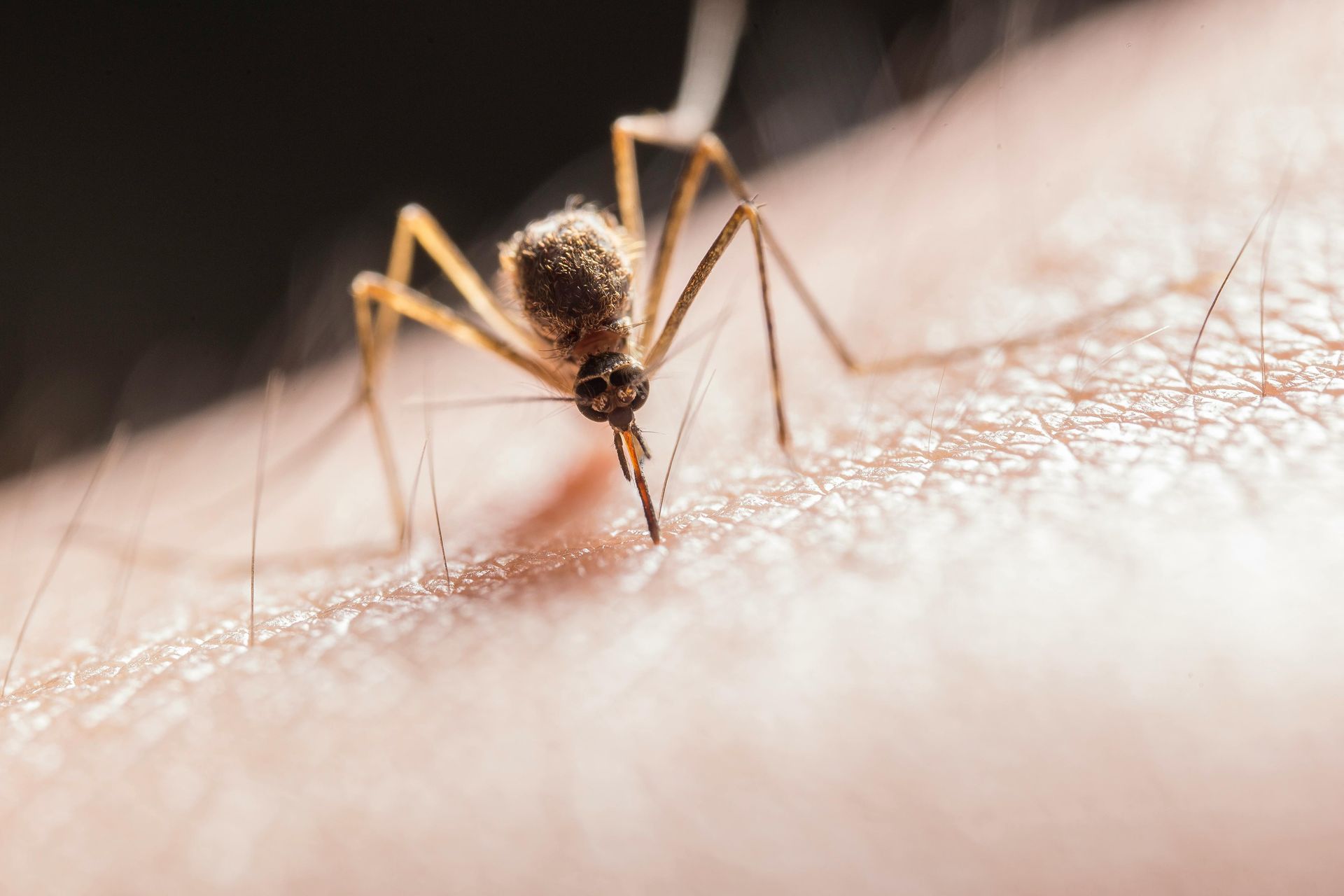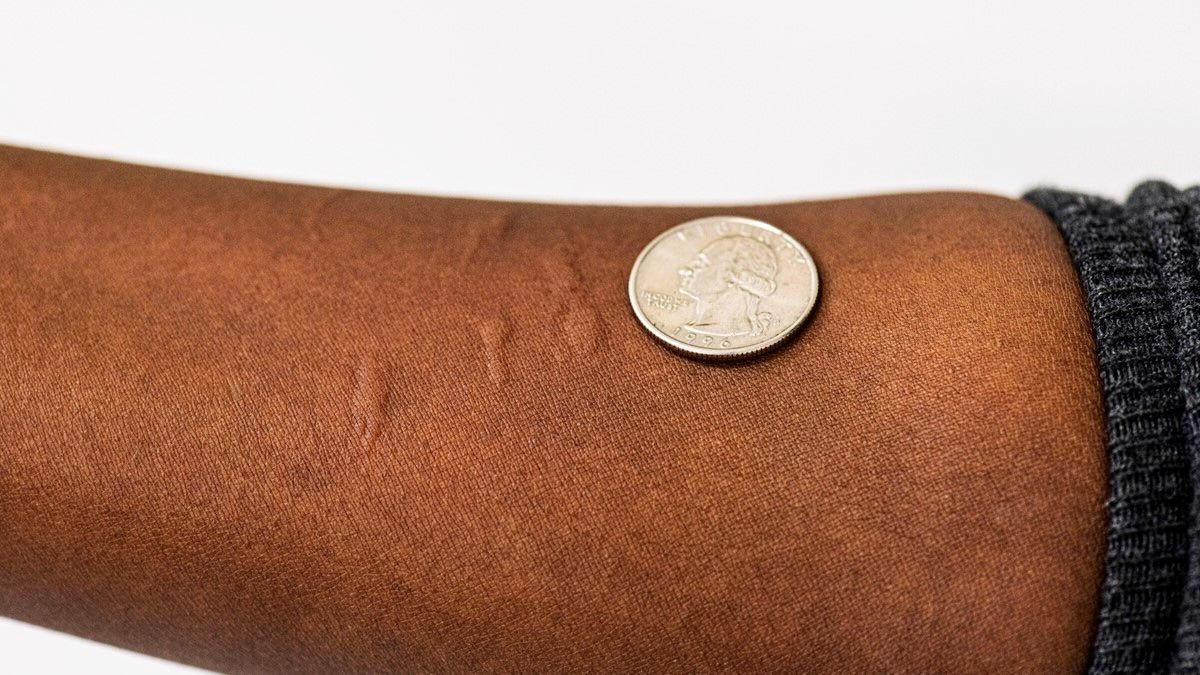Mosquito bites
Why do mosquitos bite us?
We might surmise many reasons, but actually it's simply because female mosquitos need the protein in blood to develop eggs. A mosquito can drink up to 3 times its weight in blood, or 0.000264 ounces, or 0.0075 grams (a mosquito weighs about 0.000088 ounces / 0.0025 grams).
Both female and male mosquitos eat flower nectar, and male mosquitos don't bite. Females can live about 6 to 8 weeks, and they can lay eggs about every 3 days during that time.
To note, some types of mosquitos feed only on snakes, frogs, or other cold-blooded animals, and other mosquitos prefer birds. Still others prefer cows, horses, and people. There are more than 3,500 species of mosquitos in the world, and about 175 of them are found in the U.S.
Female mosquitoes have receptors on their antennae that detect the carbon dioxide that we exhale and they follow the plumes of CO2 in the air to locate their next meal. They are attracted to octenol (a chemical released in our sweat) as well as cholesterol, folic acid, certain bacteria, skin lotions, and perfume. They use the heat sensors around their mouthparts to detect the warmth in our bodies and to locate our capillaries.
A female mosquito "bites" with a long, pointed mouthpart, called a proboscis, which is serrated. It pierces our skin, locates a capillary (small blood vessel), and draws blood through one of two tubes. A mosquito may bite 20 times before it finds a capillary! The other tube serves to pump its saliva into our skin. That saliva contains a mild painkiller (to numb the bite area) and an anti-coagulant (prevents blood from clotting).
How does our skin react?
Most people are allergic to mosquito saliva, which causes the area around the bite to swell and itch. This is caused by histamine in our bodies which dilates our blood vessels to allow white blood cells, blood plasma proteins, and other immune system elements, to access the site of the bite. The skin of some people develops blisters instead of hard bumps, and others get dark spots that look like bruises.
Don't scratch bites! Much as it is hard to do, especially for kids, it is best not to scratch bites because they can become infected. An infected bite can be red, feel warm, or a red streak may spread outward from the bite. If symptoms worsen, please seek medical attention.
Scratching might give temporary relief, but it doesn't solve the underlying itchiness problem. We discuss some options further below.
What can we do about it?
Given that mosquito-borne diseases are undesirable and being bitten by a mosquito can be highly uncomfortable, the best actions are those that help to prevent being bitten in the first place.
Most female mosquitoes lay their eggs in standing water (in as little as an inch), so a logical thing to do is to ensure that there is no standing water nearby, for example, in pails or any containers outside. In warm weather, most mosquito eggs hatch within three days.
To note, some mosquito species don't need water to hatch, so another smart thing to do is to have a multi-pronged approach to avoid mosquito bites.
There are many mosquito-repelling products on the market and if you have any questions about ingredients, please feel free to ask one of our pharmacists. To note, if you're spending time outside in the sun and need a mosquito repellant as well, it is recommended to put on sunscreen first (yes, even mineral ones that stay on top of the skin to reflect UV rays), then repellant.
Another method to avoid being bitten is to wear loose, long-sleeved clothing (long pants too). Some researchers have observed that zebra patterns may protect from biting flies, but more studies are needed and they have not studied the effect of zebra patterns on mosquitos.
There is also clothing treated with permethrin available, or you can treat your items or gear yourself with permethrin.
Finally in terms of avoidance, hanging around dragonflies or near bodies of water that have mosquitofish might be helpful as those are two main predators of mosquitoes. In fact, some towns in Maine release dragonflies every summer to help control mosquito populations.
If there is the possibility of being exposed to mosquitoes at night, using a mosquito net above your bed helps, but do be careful not to have your skin touching the net as that could be counter-productive. Also, during the day, collapse the net so that mosquitoes can't find their way inside. Some mosquito nets are treated with insecticide as well.
After being bitten, using an antihistamine or a corticosteroid can each help with the itching. Please feel free to ask our pharmacists about your options (pill, cream, ointment, patch). An alternative to medication is applying ice to the bite for about 10 minutes. That can slow the amount of blood flowing to the area and reduce inflammation, pain, swelling, and itchiness.
Chamomile tea (contains terpenoids and flavonoids that have antihistamine properties), honey (contains catalase, an enzyme that helps with minor inflammation), and oatmeal (contains gluten to help with itchiness) are other ideas suggested by the Cleveland Clinic (see the last link in the References and Resources list below).
We hope your summer is mosquito-bite-free!
Note: One of us at the pharmacy is a mosquito magnet and she has experimented with not touching or scratching bites -- yes, through the extremely itchy phases, right after the bite and in the evening -- and found that it prevents the bite from staying itchy the following days. We'd love to hear your experience since this only a sample size of one!
References and Resources
- Children's Hospital Colorado on mosquito bites: https://www.childrenscolorado.org/conditions-and-advice/conditions-and-symptoms/symptoms/mosquito-bite/
- CDC tips on avoiding mosquito bites:
https://www.cdc.gov/mosquitoes/prevention/index.html
- Cumberland County, New Jersey on 29 mosquito facts: https://www.cumberlandcountynj.gov/mosquito-29
- National Health Service UK on mosquitoes and travelling: https://www.fitfortravel.nhs.uk/advice/malaria/mosquito-bite-avoidance
- National Geographic on mosquitoes: https://kids.nationalgeographic.com/animals/invertebrates/facts/mosquito
- Entomology Today on mosquito-borne disease transmission cycles: https://entomologytoday.org/2016/07/08/who-what-and-where-do-mosquitoes-bite/
- Nature, Scientific Reports, on Zebras repel biting flies: https://www.nature.com/articles/s41598-022-22333-7
- Canadian Broadcasting Corporation on how mosquitoes don't just lay eggs in standing water: https://www.cbc.ca/news/science/mosquito-eggs-water-1.4069272
- CNN on making like a zebra: https://www.cnn.com/2019/01/17/health/zebra-stripes-insect-bites-scli-intl
- UC Davis on zebra research: https://www.ucdavis.edu/curiosity/news/how-zebra-stripes-disrupt-flies-flight-patterns
- CDC on mosquito bites and mosquito-borne viruses: https://www.cdc.gov/mosquitoes/about/about-mosquito-bites.html
- Cleveland Clinic on mosquito bites:
https://my.clevelandclinic.org/health/diseases/17695-mosquito-bites
Note - Our blog is researched and written by one of us at The Pharmacy, not AI or an external service. Let us know your thoughts on these topics and/or what you'd like to see here!






